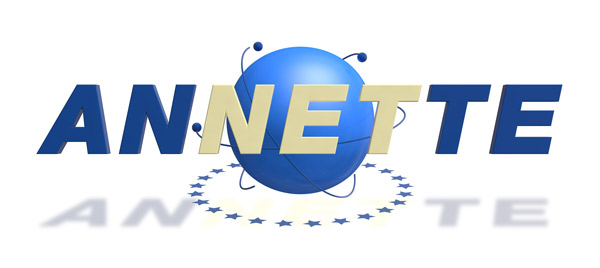

Course outline:
The course will be offered as part of the ANNETTE Summer School, running in the Nuclear Technology (NT) track, but can also be conducted independently.
The course shall impart knowledge on the specific nuclear aspects of fusion: the issues concerning the neutron irradiation, material damage, tritium breeding, tritium handling and safety, radioactive waste, and nuclear codes and standards.
Learning outcomes:
Participant in the NT-track of the summer school should learn among others:
- Why fusion reactors exploit the D-T reaction.
- How to breed the tritium.
- What the criterion is to achieve fusion and why a temperature of 150 MK is needed.
- Why superconducting magnetic fields are needed, and why bigger machines are better.
- How to exhaust the power and the particles from a reactor.
- How to assess the impact of neutron radiation on materials.
- How to shield from neutrons effectively.
- What are the safety aspects concerning tritium.
- What are the worst-case scenarios concerning safety for a fusion reactor.
- How the radioactive waste is reduced.
- What are the implications of the nuclear aspects on the design and license of a fusion reactor.

Requested Background
The training shall target fusion (industry) professionals, scientists, and students to facilitate the further migration of nuclear competences into this group, thereby supporting the current and future research and development activities for the roadmap to fusion energy.
Alternatively, the training also targets (industry) professionals, scientists, and students from the nuclear/fission field. They have already many of the nuclear competences, but they lack the fusion basics. By providing them with that knowledge they can easier interact with the fusion field and bring in their competence into this field.
The targeted trainees should have undergone a suitable engineering education, preferably in a technical subject matter important for their actual job position, at an academic level. They shall be able to understand the general engineering and physics principles at a bachelor level.
For specific nuclear knowledge (in case for the fusion students) or fusion knowledge (for the population from the nuclear field), there are no prerequisites. The training aims at providing this basic knowledge in a comprehensive way.
Teacher(s):
Experts on the topics to be addressed in the training shall develop presentations for the knowledge oriented part, and conduct the related training.
Method of Delivery:
The training includes a mix of activities: plenary lectures discussing the basic ingredients, technical lectures to discuss in an interactive manner with a smaller audience the nuclear issues in more detail. Smaller exercises or assignments will be part of these lecture.
Final Examination:
After the training, feedback from the trainees shall be collected to evaluate the course. Furthermore, the trainees shall take a test to check whether they have achieved the learning goals.
Approximate Date of Availability of the Course Material:
June 2018
